Geography
“The study of geography is about more than just memorising places on a map. It’s about understanding the complexity of our world, appreciating the diversity of cultures that exist across continents. And in the end, it’s about using all that knowledge to help bridge divides and bring people together.” Barak Obama
Welcome
With the national curriculum at our core, we aim to deliver a high quality, rigorous, exciting, and balanced geography curriculum at Balcarras. Geography is taught as a discrete subject at both Key Stage 3 and Key Stage 4 with the intention of providing pupils with the skills to become geographically literate citizens within a dynamic and ever changing world. The study of the subject will enable them to develop the life skills and foundation knowledge for them to be responsible citizens, who are able to understand and contribute to a sustainable future both locally and globally.
By studying geography pupils will build an understanding about their place in the world and be encouraged to appreciate the differences beyond their immediate locality and experiences to become curious, confident, and independent thinkers. Our knowledge rich curriculum encourages pupils to develop a comprehension and understanding of current geographical events, places, and issues, from local to global, and empower our young people to become confident, active, and global members of society. Students take the knowledge and understanding gained from their learning into their future, thinking about their role and choices in an increasingly technological, globalised, and complex society.
As a powerful bridging subject geography has strong cross curricular links and the study of geography equips pupils with a variety of transferable skills, such as greater spatial awareness, literacy, communication, numeracy, enquiry, problem solving and computing. Geographical enquiry also helps our young people to develop important skills for use inside the classroom and in later life.
Fieldwork is an essential element of this, allowing students to visualise and experience geography in their local environments, as well as further afield. This allows the development of a strong interest in their own surroundings and an appreciation of the variety and interconnectedness within the physical and human landscapes and processes that exist in our world. It is the department’s intent that geography should encourage students to gain enjoyment and inspiration from their geographical understanding whilst feeling a sense of success from their achievements. As a result, this allows them the skills, understanding and confidence to engage critically with real world issues and places.
The curriculum in geography supports the whole school curriculum aims by…
- being broad, balanced and relevant, developing essential geographical knowledge, understanding and skills, regardless of gender, ability, ethnicity or social background
- ensuring equal access to learning for all pupils, with high expectations for every pupil and appropriate levels of challenge and support
- encouraging students to enjoy their geographical learning and get a sense of success through their achievements
- fostering literacy and numeracy skills through geography
- generating a wealth of cross-curricular activities including Eco club, Duke of Edinburgh award and fieldtrips in both the UK and overseas which are open to all
- equipping pupils with the geographical knowledge and cultural capital they need to contribute positively to their community
- preparing students for the next stage in their lives by encouraging resilience, self-reliance and an understanding of their responsibility to take ownership of their own learning
Meet the department
The geography department is made up of a team of 5 experienced, enthusiastic and committed teachers with Miss Searle as Head of Department. In addition to their primary role as geography teacher Mrs Cullis is Assistant Headteacher, Miss Niblett is Head of Selvey House & Associate Assistant Headteacher, Mr Lane and Mr Pearce is DofE Manager.
Geography is primarily taught in 4 specialist classrooms. All classrooms have interactive whiteboards. We also have a range of high quality departmental resources such as class iPads, specialist GIS software, modern texts and a set of 20 computers for pupil use.
We are all highly committed to ensuring that pupils make the best possible progress in all key stages, and are particularly proud of our excellent results at both GCSE and A Level which consistently exceed national averages. In 2024, 79% of A Level geographers achieved A*-B and 52% of GCSE geographers achieved grades 9-7.
Curriculum Map KS3
Curriculum map KS4
|
|
AUTUMN TERM 1 |
AUTUMN TERM 2 |
SPRING TERM 1 |
SPRING TERM 2 |
SUMMER TERM 1 |
SUMMER TERM 2 |
||||||
|---|---|---|---|---|---|---|---|---|---|---|---|---|
|
Year 10 |
|
|
Physical landscapes in the UK - Glacial
|
Physical landscapes in the UK - Rivers
|
|
|
||||||
|
Year 11 |
Rivers Fieldwork
|
The Living World – Ecosystems, Tropical Rainforests and Cold Environments |
The Living World – Ecosystems, Tropical Rainforests and Cold Environments |
|
|
Geography Issue Evaluation |
||||||
Curriculum map Year 12
|
|
AUTUMN TERM 1 |
AUTUMN TERM 2 |
SPRING TERM 1 |
SPRING TERM 2 |
SUMMER TERM 1 |
SUMMER TERM 2 |
|---|---|---|---|---|---|---|
|
Teacher 1 |
|
|
|
Coastal systems and landscapes
|
Coastal systems and landscapes
|
NEA launch
|
|
Teacher 2
|
|
|
Coastal systems and landscapes
|
Coastal systems and landscapes
|
Coastal systems and landscapes
|
NEA launch
|
Curriculum map Year 13
|
|
AUTUMN TERM 1 |
AUTUMN TERM 2 |
SPRING TERM 1 |
SPRING TERM 2 |
SUMMER TERM 1 |
SUMMER TERM 2 |
|---|---|---|---|---|---|---|
|
Teacher 1 |
|
|
|
|
|
|
|
Teacher 2 |
|
|
|
|
|
|
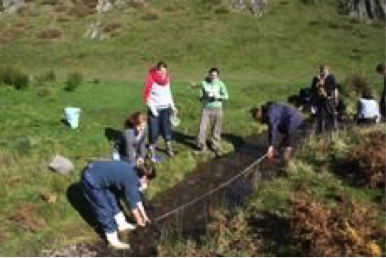
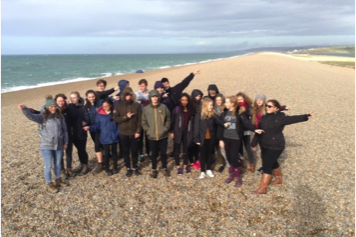
Learning Journey for Geography
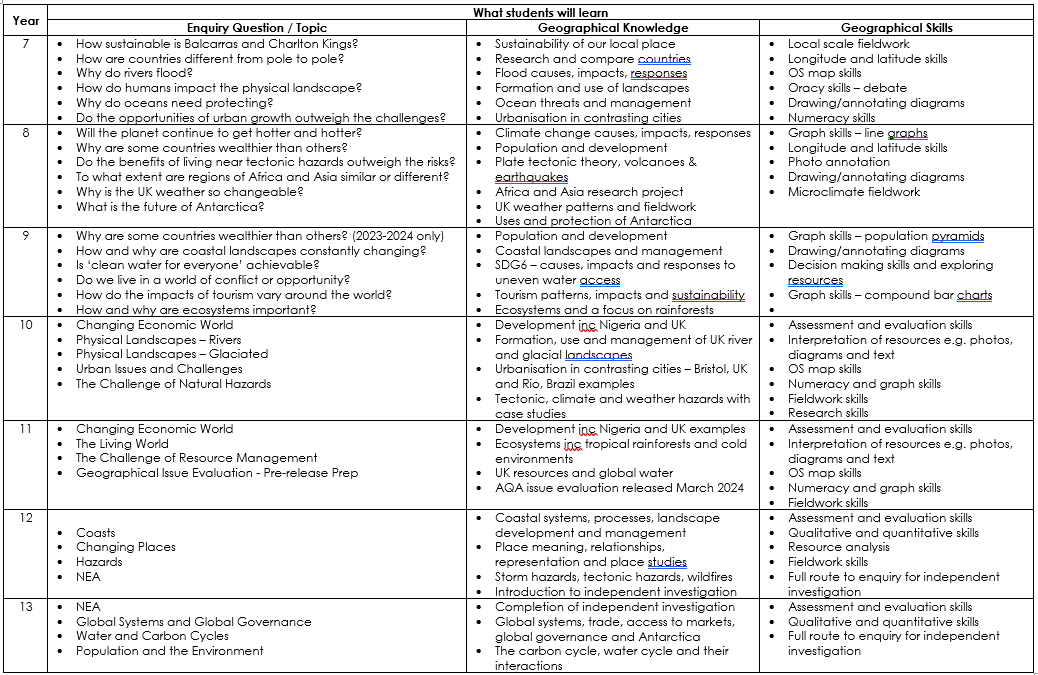
Key Stage 3
In KS3 geography at Balcarras we have our curriculum wheel
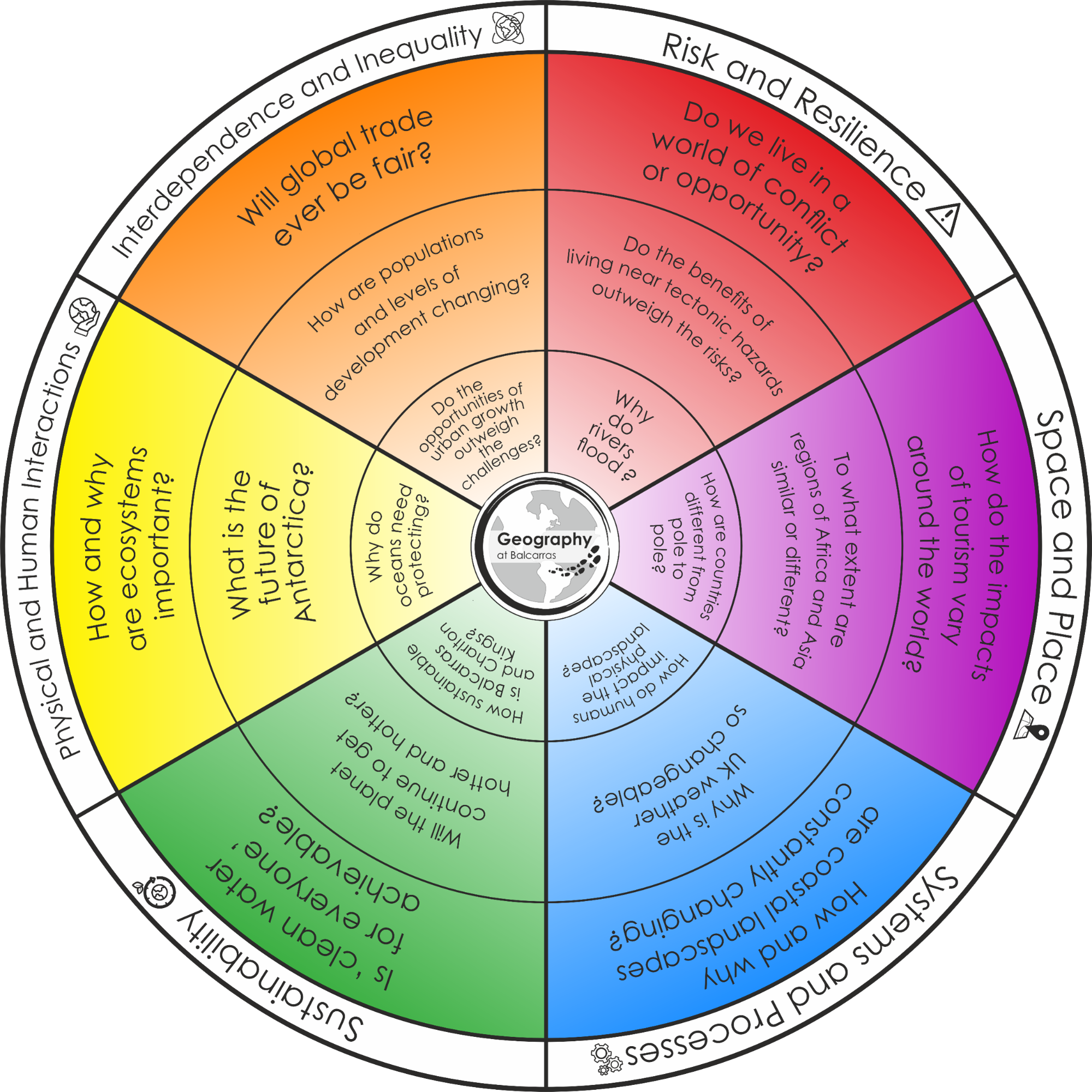 It is a 3 layered wheel, with each layer showing the topics studied in each year of KS3 geography at Balcarras.
It is a 3 layered wheel, with each layer showing the topics studied in each year of KS3 geography at Balcarras.
The wheel is also split into 6 wedges. Each wedge of the wheel focuses on a different key concept, and pupils will study one topic in each wedge during each year. The road map below shows the learning journey that pupils will undertake:
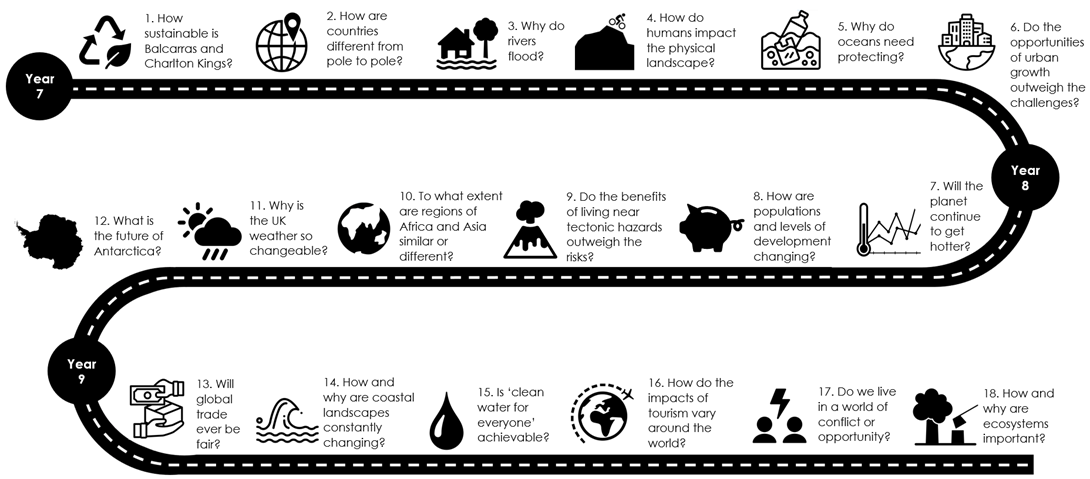
At KS3 pupils will work primarily in their exercise book and this will be a record of their learning journey throughout the year. They will receive regular meaningful, motivating and memorable feedback from their teacher and their peers to enable them to make best possible progress.
There are 3 graded assessments in each year of KS3 Geography at Balcarras. The assessments are spread throughout the year and are designed to provide meaningful data about pupil progress in line with the whole school reporting calendar.
We aim to offer a varied array of co-curricular opportunities to extend pupils’ learning beyond the classroom. These opportunities are offered to all pupils and include:
- Year 7 visit to Charlton Kings
- Year 7 visit to Cheddar Gorge
- Year 8 visit to the Natural History Museum, London
- Year 8 author visit
- Year 9 visit to Cotswold Wildlife Park
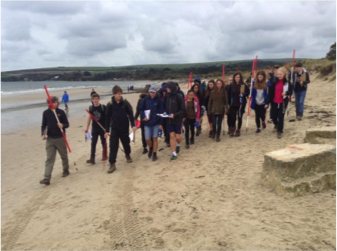
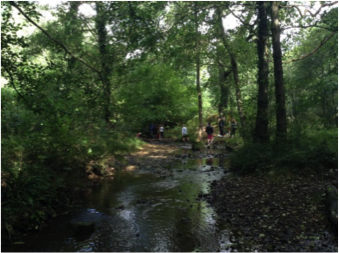
GCSE
Geography is a popular option subject at Balcarras. In KS4 geography we follow the AQA GCSE Geography specification.
Pupils study three human geography and three physical geography topics. These include natural hazards (tectonic, weather and climatic), development, physical landscapes and resource management amongst others. There is emphasis on current issues and a broad skills base, enabling pupils to gain a wider insight into the world around them but also enhance their employability with numeracy, literacy and discursive skills.
In addition, pupils will undertake two contrasting fieldwork enquires to Temple Quarter in Bristol and Blackpool Brook in the Forest of Dean. They will also investigate a topical geographical issue.
At KS4, there is a graded assessment at the end of each physical or human geography topic, as well as an assessment of fieldwork skills. In addition, pupils will be assessed as part of the trial/mock exams and end of year exams scheduled in the whole school calendar. All assessments take the form of past paper questions. Pupils will receive regular meaningful, motivating and memorable feedback from their teacher and their peers to enable them to make best possible progress.
The road map below shows the learning journey that pupils will undertake:
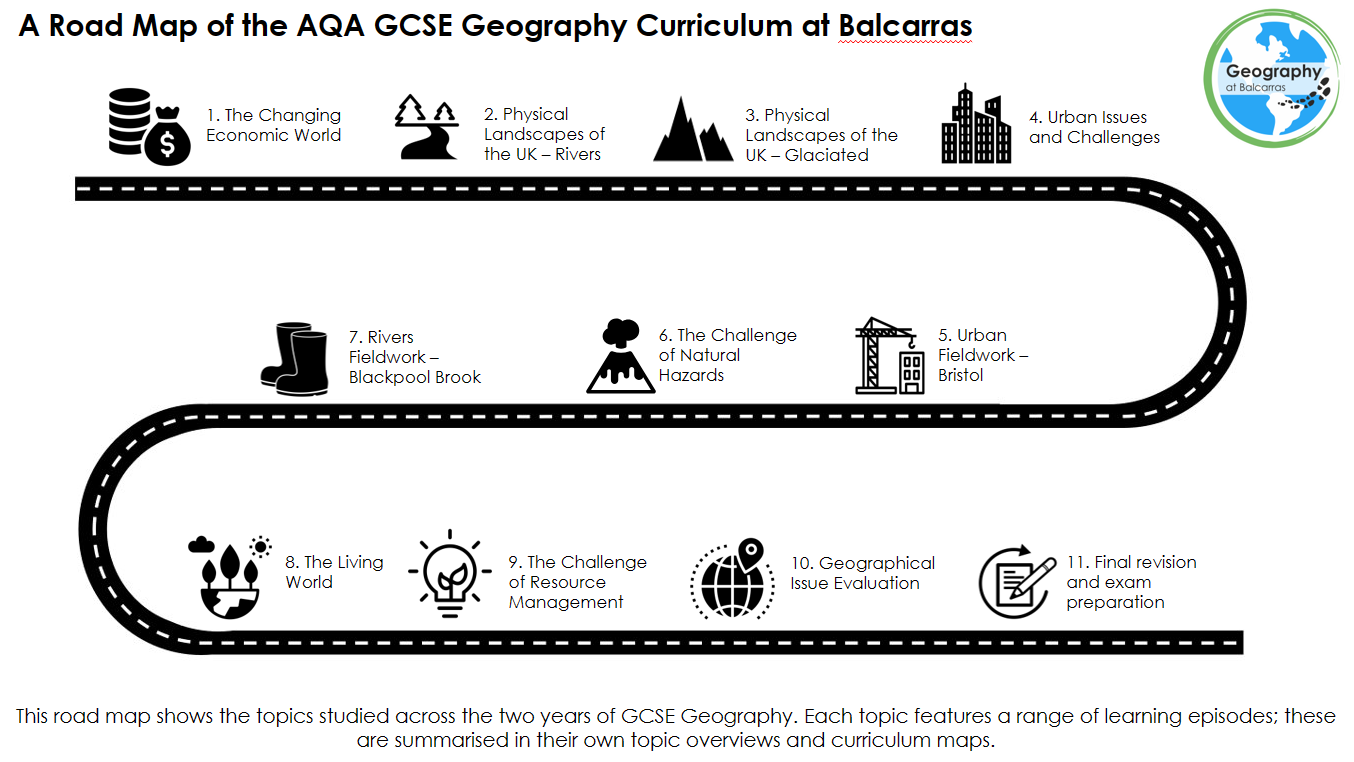
A Level
Geography is a very popular option subject at Balcarras and attracts pupils from both within Balcarras and externally. In KS5 geography at Balcarras we follow the AQA A Level Geography specification.
Pupils study three human geography and three physical geography topics. These include hazards, coasts, global systems and population. In addition, pupils will undertake four days of fieldwork, part of which will include a residential trip to Dorset and a day trip to Cheltenham. They will use these skills to undertake an independent investigation (the NEA) on a geographical topic of their choice.
At KS5, there is a graded assessment at the end of each physical or human geography topic. In addition, pupils will be assessed as part of the trial/mock exams and end of year exams scheduled in the whole school calendar. All assessments take the form of past paper questions. Pupils will receive regular meaningful, motivating and memorable feedback from their teacher and their peers to enable them to make best possible progress.
The road map below shows the learning journey that pupils will undertake:
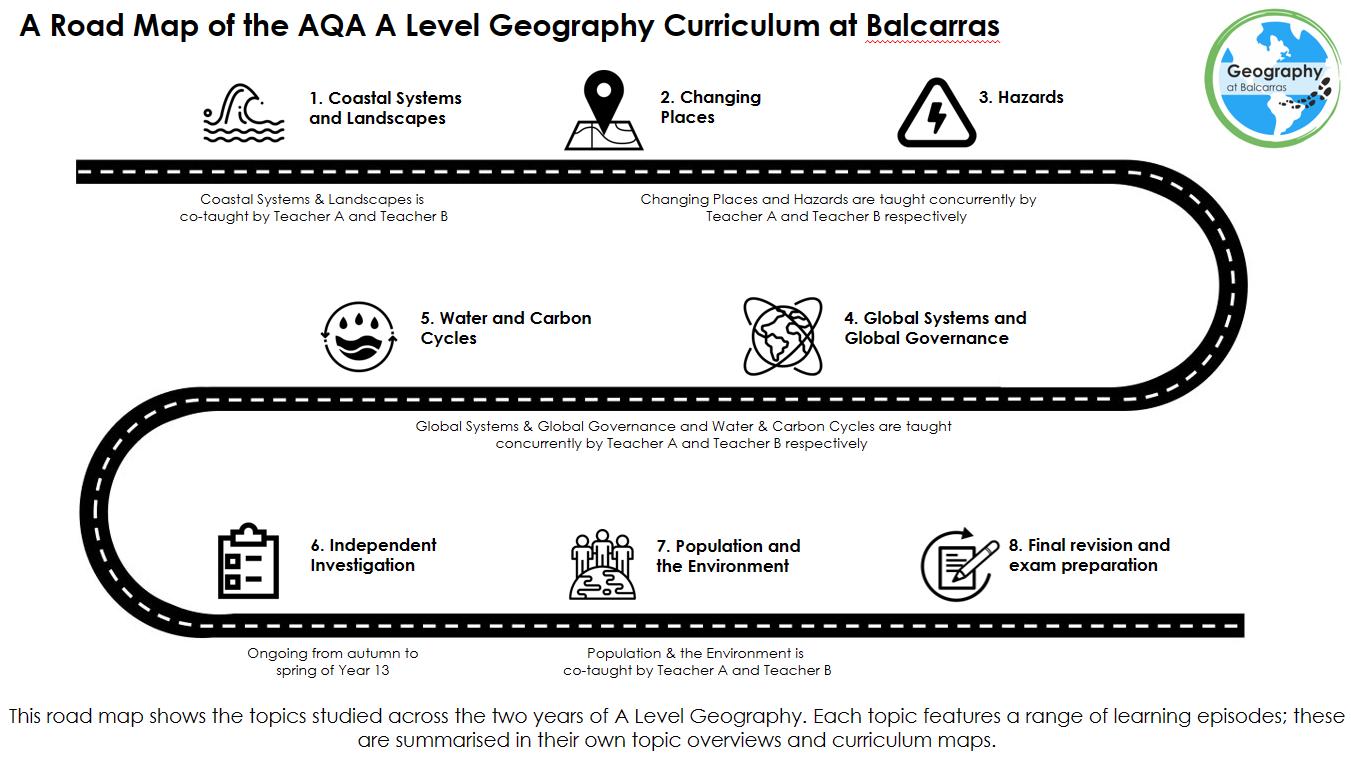

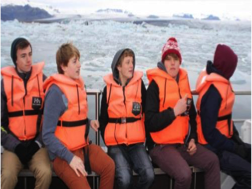
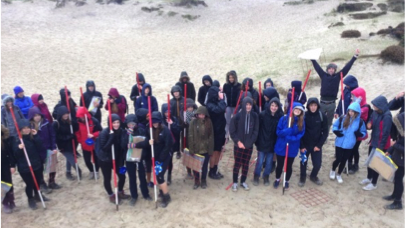
Fieldwork and Trips
At KS3, the opportunities are numerous and include:
- Year 7 visit to Cheddar Gorge
- Year 8 visit to the Natural History Museum, London
- Year 8 author visit
- Year 9 visit to Cotswold Wildlife Park
At KS4, pupils will undertake two contrasting fieldwork enquires to Temple Quarter in Bristol the spring of Year 10 and Blackpool Brook in the Forest of Dean in the autumn of Year 11. There is also an optional trip to Snowdonia for Year 10 pupils to explore glaciated landscapes that will take place in June 2024.
At KS5, pupils will undertake a minimum of four days of fieldwork, part of which will include a residential trip to Dorset to study coastal landforms and coastal management. In addition, pupils will study regeneration and microclimates in a day trip to Cheltenham. We also visit the University of Gloucestershire for a GIS session in their geography department to equip pupils with essential skills for their NEA.
We also organise a bi-annual international residential. Most recently, in October 2023 we visited Iceland with 65 pupils from Years 11 to 13. Previous international trips have visited Italy or the west coasts of the USA too. Our next trip will be October 2025 so please look out for the launch in autumn 2024. It is likely to be open to pupils that will be in Years 11 to 13 at the time of departure, though this will be confirmed at the launch.

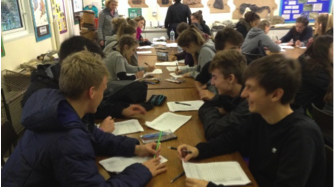
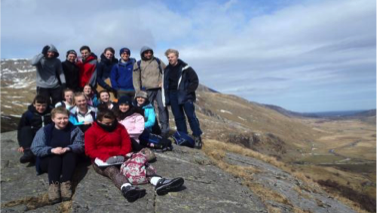
Inclusion in Geography
Good geography teaching for pupils with SEND is the same as for all students. In geography at Balcarras we ‘teach to the top’ meaning we aim high for all our learners but provide scaffolds and support for any learner that may need this. As a school we use the graduated approach and in geography we work with the Individual Learning Department to remove barriers to learning with this model.
The Education Endowment Foundation (2020) found strong evidence that improving high quality teaching for all students will improve outcomes for students with SEND. Therefore, their advice is that all teachers should develop a repertoire of strategies and use these flexibly in response to individual needs, including those with SEND. As such, in geography at Balcarras we follow this approach. Key strategies include working with teaching assistants, scaffolding, flexible groupings, use of technology and cognitive strategies.
Across all key stages of geography at Balcarras, staff identify spelling errors in geographical key terms and give pupils the opportunity to practice the correct spelling. At KS3, the topic overview sheet provides the most important key words for the topic, along with a pupil task to define these and find a word origin. A more extensive key word list can then be found by scanning the QR code to access the curriculum map for each topic on the Geography at Balcarras website. At KS4 and KS5, pupils are given a past paper question booklet for each topic. Within this booklet, they are given a key word list and accompanying definition for the geographical key terms in the topic. As with KS3, key word lists are also included on the curriculum map for each topic, accessed via the Geography at Balcarras website.
Future Career Paths
If you would like to further your own geography knowledge, have a look at our recommended geographical reads.
